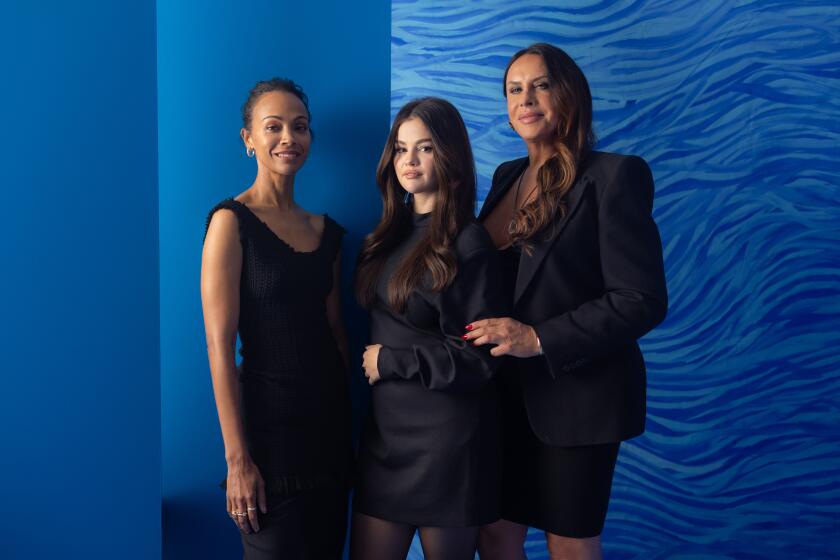MOVIE REVIEW : ‘Love’: Playing It Nice and Rough : Exceptional Acting Powers Story of Up and Downs of Ike and Tina Turner
You may not respect “What’s Love Got to Do With It,” but enjoying it is inescapable.
A high-energy mixture of spectacular music, vigorous acting and cliched situations, this is a rough-and-rowdy fairy tale with a feminist subtext, and if that sounds perplexing, “Love” so pumps up the volume you won’t have much time to think about it.
For the record:
12:00 a.m. June 10, 1993 For the Record
Los Angeles Times Thursday June 10, 1993 Home Edition Calendar Part F Page 2 Column 3 Entertainment Desk 2 inches; 47 words Type of Material: Correction
Movie Opening--”What’s Love Got to Do With It” opened Wednesday at Pacific’s Cinerama Dome and AMC Century 14. It opens Friday at selected theaters and goes citywide on June 18. In addition, Kate Lanier is the film’s screenwriter. The review in Wednesday’s Calendar misstated the movie’s opening schedule and misidentified the writer.
Though it is based on her autobiography, “I, Tina,” and is subtitled “The true life story of Tina Turner,” “What’s Love” (citywide) has less in common with anyone’s reality than with generations of glossy show business biopics like “Lady Sings the Blues” and “The Doors,” where a singer’s triumphs and tragedies are written in large neon letters for the world to see and sob over.
And Tina Turner, both during and after her tumultuous marriage to the mysterious Ike, did seem to live the kind of fast-lane soap-opera life the public expects rock stars to have, with personal tragedies jostling professional successes and an abusive, drug-using husband always lurking behind the surface glamour.
Better than that, the passionate songs Tina was singing onstage often paralleled what was happening in her life offstage, and writer Jane Lanier has cleverly structured her script around the similarities. So when Tina sings “A Fool in Love,” that’s just what she is; by the time she is telling audiences in “Proud Mary” that “we don’t do anything nice and easy,” her relationship with Ike is mired in pain.
Director Brian Gibson, best known for the TV movie “The Josephine Baker Story,” was definitely a commercial choice for this audience-friendly tale of glitz and woe. He knows how to infuse the energy of the music into this often hokey story, and he is discretion itself when it comes to handling the film’s drug use, judiciously focusing not on the substance but on fingers with the odd habit of wandering toward the nose.
The biggest asset “What’s Love Got to Do With It” has, however, are the exceptional actors who play Tina and Ike. Angela Bassett (last seen as Betty Shabazz in “Malcolm X”) and Laurence Fishburne worked together in “Boyz N the Hood,” and they bring to this film not only the rapport they developed there but also the ability to deepen characters in ways that are not in the script, to bring more to their roles than seems to be there.
It is Tina, appropriately enough, whom we meet first, as a little tyke named Anna Mae Bullock who scandalizes the church choir in Nutbush, Tenn., by putting more sass into a hymn than is absolutely necessary. Returning home, Anna discovers her mother in the process of walking out, leaving her to be raised by a convenient, standard-issue kindly grandmother.
Cut to 1958, when a presumably teen-age Anna joins her mother, Zelma (Jenifer Lewis), and her sister, Alline (Phyllis Yvonne Stickney), in St. Louis. On her first night there (this movie does not waste time), she goes to a nightclub and sees local R&B; star and major-league cool dude Ike Turner and his Kings of Rhythm.
As beautifully played by Fishburne, it is not difficult to see why Ike was the king of hearts. With his slow smile, polished self-confidence, impeccable hair and half-opened lounge-lizard eyes, Ike wears a pastel blue topcoat with as much aplomb as Cary Grant modeling a tuxedo. And though he relished being the center of attention, once he hears Anna’s powerful voice he is smitten without a doubt.
Even though she’s lip-syncing rather than singing, audiences will inevitably feel the same way about Bassett. Her Anna Mae/Tina moves gradually from an uncertain ingenue to a brassily confident performer to an in-charge woman and Bassett is more than equal to all the changes. Whether she is strutting defiantly on stage or putting a wide smile on her wonderfully mobile, emotional face, Bassett’s Tina embraces life in a way that is infectious and is sure to do for her career what Fishburne’s work in “Boyz” did for his.
Because Fishburne and Bassett have this singular on-screen connection, their relationship feels more complex than it otherwise would. And at first, even though Ike changes her name and seems determined to work her into the ground, the two share a bond based on the traditional dream they both have of show-biz success.
But when that success comes, it brings, for reasons apparently drug-related but never made quite clear, a darkening of Ike’s personality and physical violence toward Tina that are the emotionally strongest parts of the film (rated R for domestic violence, strong language, drug use and some sexuality). This sets up “What’s Love’s” final part, where Tina, like a heroine on a quest, searches for the strength to literally get a room of her own and strike out toward the grail of international stardom.
Though the picture rightfully belongs to Bassett, a final word must be said about Fishburne, who never fails to make Ike seem human if not defensible. Even in defeat, he is remarkably compelling. Though “What’s Love Got to Do With It” is much broader than his performance, the film and the actor do share an important characteristic: Try as you might, you won’t be able to take your eyes off either one.
‘What’s Love Got to Do With It’
Angela Bassett Tina Turner
Laurence Fishburne Ike Turner
Vanessa Bell Calloway Jackie
Jenifer Lewis Zelma Bullock
Phyllis Yvonne Stickney Alline Bullock
A Krost/Chapin production, released by Touchstone Pictures. Director Brian Gibson. Producers Doug Chapin, Barry Krost. Executive producers Roger Davies, Mario Iscovich. Screenplay by Kate Lanier, based on “I, Tina,” by Tina Turner and Kurt Loder. Cinematographer Jamie Anderson. Editor Stuart Pappe. Costumes Ruth Carter. Music Stanley Clarke. Production design Stephen Altman. Art director Richard Johnson. Set decorator Rick Simpson. Running time: 1 hour, 59 minutes.
MPAA-rated R (domestic violence, strong language, drug use and some sexuality).
More to Read
Only good movies
Get the Indie Focus newsletter, Mark Olsen's weekly guide to the world of cinema.
You may occasionally receive promotional content from the Los Angeles Times.











